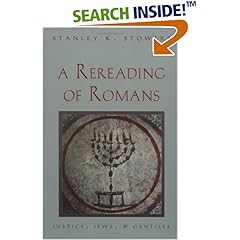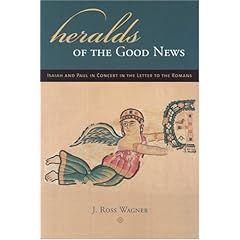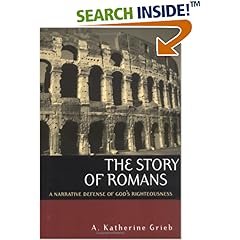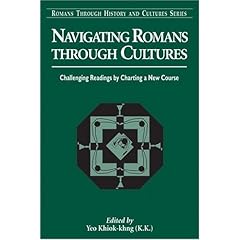 Stowers, Stanley K. A Rereading of Romans: Justice, Jews, and Gentiles. New Haven: Yale University Press, 1994.
Stowers, Stanley K. A Rereading of Romans: Justice, Jews, and Gentiles. New Haven: Yale University Press, 1994.
This book blew me away, it shattered a number of my long held convictions about the letter to the Romans, and made me reread the letter a number of times. I was not, and am not now, entirely convinced about all of Stowers' arguments. But it made me take seriously Paul's call as an apostle to the nations.
 Keesmaat, Sylvia C. Paul and His Story: (Re)Interpreting the Exodus Tradition. JSNTSup 181; Sheffield: Sheffield Academic Press, 1999.
Keesmaat, Sylvia C. Paul and His Story: (Re)Interpreting the Exodus Tradition. JSNTSup 181; Sheffield: Sheffield Academic Press, 1999.
Sylvia wrote this as here Ph.D. thesis under Tom Wright, and it is the book that made me pursue my own thesis in Romans. Although it only deals with Romans 8, it does a wonderful job of teasing out the exodus narrative throughout that chapter. She continues to write amazing stuff on Paul having a skill at merging together serious biblical studies with thought provoking contemporary theology. Check out here more accessible Colossians remixed.
 Wagner, J. Ross. Heralds of the Good News: Isaiah and Paul in Concert in the Letter to the Romans. Leiden: Brill, 2003.
Wagner, J. Ross. Heralds of the Good News: Isaiah and Paul in Concert in the Letter to the Romans. Leiden: Brill, 2003.
Another product of a Ph.D. and student of Richard Hays. This work applies Hays' methodological master piece 'Echoes' to the texts of Romans 9-11. Wagner is brilliant and methodical in his use of the second Isaianic corpus as a pretext for unlocking the 'meaning' of this tricky section in Paul's letter.
 Grieb, A. Katherine. The Story of Romans: A Narrative Defense of God's Righteousness. Louisville: Westminster John Knox Press, 2002.
Grieb, A. Katherine. The Story of Romans: A Narrative Defense of God's Righteousness. Louisville: Westminster John Knox Press, 2002.
Argues that Romans is a narrative defense of God's Righteousness, a lot of good stuff are packed into this little gem. This is a short work and probably the most accessible work on this list.
 Yeo, Khiok-Khng. Navigating Romans through Cultures : Challenging Readings by Charting a New Course, Romans through History and Culture Series. New York: T & T Clark International, 2004.
Yeo, Khiok-Khng. Navigating Romans through Cultures : Challenging Readings by Charting a New Course, Romans through History and Culture Series. New York: T & T Clark International, 2004.
This is a collection of essays that takes as its starting point the inability to interpret a text outside of ones own context. Some of the best thought provoking readings on the letter to be compiled into a monograph. My personal favorite is Monya Stubbs' piece on Romans 13.
 Elliott, Neil. The Rhetoric of Romans: Argumentative Constraint and Strategy, and Paul's Dialogue with Judaism. JSNTSup 45; Sheffield: JSOT Press, 1990.
Elliott, Neil. The Rhetoric of Romans: Argumentative Constraint and Strategy, and Paul's Dialogue with Judaism. JSNTSup 45; Sheffield: JSOT Press, 1990.
Not the first work to deal with rhetoric in Paul, but it was the first work I read on the subject. Rhetoric helps us make better sense of the letter, and anybody who ignores both ancient and modern rhetoric in the study of Romans will have a definite disadvantage of making sense out of Paul's argument.
 Stendahl, Krister. Final Account: Paul's Letter to the Romans. Minneapolis: Fortress, 1995.
Stendahl, Krister. Final Account: Paul's Letter to the Romans. Minneapolis: Fortress, 1995.
This short little work changed the way I interpret Romans 2.1, Stendahl is such an important figure in Pauline studies, and this work gives you a glimpse of why that is.
 Nanos, Mark D. The Mystery of Romans: The Jewish Context of Paul's Letter. Minneapolis: Fortress, 1996.
Nanos, Mark D. The Mystery of Romans: The Jewish Context of Paul's Letter. Minneapolis: Fortress, 1996.
When I read this work I was totally unprepared for the richness and lucidity of the arguments found inside. It was such a fresh way of reading Romans that even while writing this I am reminded that I have to read this again. The big splash this book made was in the re-interpretation of the 'weak' and 'strong'.
 Esler, Philip Francis. Conflict and Identity in Romans: The Social Setting of Paul's Letter. Minneapolis: Fortress Press, 2003.
Esler, Philip Francis. Conflict and Identity in Romans: The Social Setting of Paul's Letter. Minneapolis: Fortress Press, 2003.
Very strong work on the dynamics of group identity and how Paul went about forming a new group identity out of competing influences. The best social scientific reading of the Letter to date!
 Tobin, Thomas H. Paul's Rhetoric in Its Contexts: The Argument of Romans. Peabody: Hendrickson Publishers, 2004.
Tobin, Thomas H. Paul's Rhetoric in Its Contexts: The Argument of Romans. Peabody: Hendrickson Publishers, 2004.
There is so much good in this work, although a reasoned approach, I feel it ties the letter to the Romans to tightly to the letter to the Galatians. But that being said it is very thought provoking and at times quite convincing.




2 comments:
What about Luther on Romans? Hard to beat that work.
I consider Luther's work a commentary on the letter to the Romans, thus it doesn't make the list.
Post a Comment